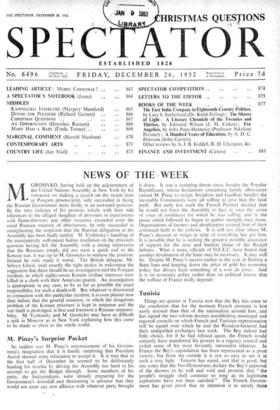NEWS OF THE -WEEK
MGROMYKO, having held up the adjournment of the United Nations Assembly in New York by his insistence on making a speech on the recent riots • at Pongam prison-camp, only succeeded in fixing the Russian Government more firmly in an awkward position. By the very violence of his protests, which, with their side references to the alleged slaughter of prisoners in experiments with flame-throwers and other weapons, exceeded even the usual Russian measure of abusiveness, he only succeeded in strengthening the suspicion that the Russian delegation at the Assembly has been badly rattled. M. Vyshinsky's handling of the transparently well-meant Indian resolution on the prisoners question having left the Assembly with a strong impression that the Russians simply did not want a quick end to the Korean war, it was up to M. Gromyko to retrieve the position. Instead he only made it worse. The British delegate, Mr. Selwyn Lloyd, used exactly the right tactics in welcoming the suggestion that there should be an investigation into the Pongam incident, in which eighty-seven Korean civilian internees were killed in a clash with their American guards. An investigation is appropriate in any case, to fix as far as possible the exact responsibility for such a death-roll. But whatever is discovered in connection with this particular incident, it is even plainer now than before that the general situation, in which the dangerous problem of the Korean prisoners is kept in suspense and the war itself is prolonged, is first and foremost a Russian responsi- bility. M. Vyshinsky and M. Gromyko may have as difficult a task in Moscow as in New York explaining how this came to be made so plain to the whole world.


























